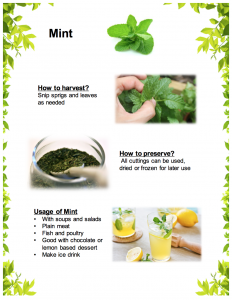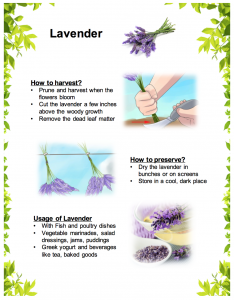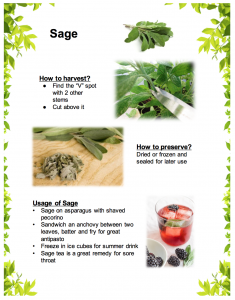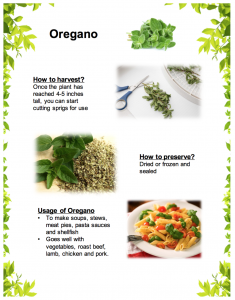It is almost the end of this term, and this will be the last posting of term about our project with Gordon Neighbourhood House.
In this blog post we will be sharing the executive summary of our final group report and a moment of significant change.
Executive Summary
For this project Group 20 had the opportunity to work with Gordon Neighbourhood house in West End Vancouver in their herbs extension project. The goal of our community partner is to have more herb garden located in West End and to make herbs free for all community member to enjoy. To achieve this goal our group set the following objectives: identify potential spaces suitable for building new herb gardens, increase the usage of the herb gardens, and compile research findings into a booklet to share with the community in an effort to improve food literacy.
Our group divided into two teams to be more efficient in our objectives. We wrote proposal letters for home owners describing what we need from them and how it will help the community. This letter was approved by the community partner which allow team one to start looking for potential sites and distribute the letters to the homeowners. At the same time Team two begin research to be compiled into a booklet that will contain new herbs that can be grown in Vancouver climate, how to harvest and use the herbs in different cuisines. Further they explore different signs design to attract people in letting them know that the herbs are free to harvest.
Near the end of the term, team one were able to send letters to 15 approved sites from our community out of the 30 sites that we found. The response was that three owners are interested in building the herb garden. Team two was also successful in designing an informative booklet and creating a new sign. We send a survey to the community partner asking her opinion on the quality work of the team two. We received good response in the booklet as it met the community partner’s expectation, however, the sign fell short as it was not creative enough.
Reflecting on this project we noticed our shortcomings that might contribute to higher success of the community partner’s goal. We didn’t want to intrude the homeowners therefore, we were passive in the distribution of the letters. Face to face contact with the homeowners might let more of them give permission. Better communications with our community partner during the design process will lead to better sign that will encourage people to use the herb garden and increase food literacy in the neighbourhood achieved through community engagement in the gardens.
A Moment of Significance
What?
A moment of significance in our project is when we finished our herb booklet and got the feedback from our Gordon Neighbourhood House Community partners. Before we started working on the booklet, we had a discussion with our community partner concerning the content in the booklet. We determined that in order to make the harvest process easier for people in the west-end community, the information about the harvest process, preservation process, and the sample cuisine of each herb are essential, deciding to separate the tasks in our groups to make our work more efficient.
While each of us is responsible in researching several types of herbs, we designed the herb booklet in a simple, concise, yet informative format. Moreover, we put information in bullet point for the booklet to be view-friendly, and chose a green dominant hue background to match the theme of herbs for the booklet to have a better appearance.
Some pages in our herb booklet




So what?
From our community partner, she provided us with positive and constructive feedbacks and really liked many of our suggestions concerning the usage of herbs; we were greatly encouraged by the feedback of our community partners.
Furthermore, we were really glad that we have made little steps towards improving the food literacy in the Vancouver west-end community. In fact, among many of food literacy improvement initiatives in Canada, local communities play an important role ensuring the development of the food literacy (Improving Food Literacy in Canada, 2010). As a result, we strongly feel that more of the innovative programs in the communities, such as the herb garden program in GNH, should be encouraged to raise the food literacy gradually.
Besides, the community based programs in GNH like “community lunches”, “urban farming” and “community herb garden” are also aiming at increasing food security in the vancouver west-end community. The “urban farming” and “community herb garden” increase the food access for people in the community, while providing the food and ingredient for the “community lunches”. “Community lunches” charge from free to 5 dollars also provide the chance for people with a lower income to participate and enjoy the healthy food (All Programs – GordonHouse.org., n.d.).
“Food literacy” and “food security” are actually closely related. People with a disadvantage of living might not be food insecure because of their knowledge and skills can satisfy their daily dietary needs (Vidgen, 2014). This implies that food literacy is a potential underlying factor that can aid increasing the food security.
Last but not least, it was a fantastic experience completing the booklet together with a group. Simeon Kondev once remarked, “I feel like every project I work on is a dream, so long as I am learning”.Through everyone’s suggestions and effort in performing researches, we cooperated effectively and efficiently and finished such booklet that could help the GNH garden. In the process, everyone was learning.
Now what?
In the herb booklet design project, our group achieved a successful outcome. Still, we could have a better management of time when we are working in a group. Since the due date our community partner set was simply finishing the booklet before the end of our term, we did not make very specific schedule for each stage of our project. It would be better if we split up every step of our project and set due date for each task ourselves. In this way we would have a more efficient way to achieve a better outcome.
After the actual experience of engaging in the community based program, we felt like “food security” and “food literacy” are no long two words that only appear on readings and textbooks. Instead, these are two aspects that we can really change by ourselves. Thinking about the future experience and career, we could participate in and volunteer for more community-based programs like community kitchen and herb gardens to improve the “food security” and “food literacy” in Vancouver.
All Programs – GordonHouse.org. (n.d.). Retrieved from http://gordonhouse.org/programs/farming-initiatives/
Helen A. Vidgen. (2014). Food Literacy: What Is It and Does It Influence What We Eat? Retrieved from: http://eprints.qut.edu.au/66720/1/Helen_Vidgen_Thesis.pdf
Improving Food Literacy in Canada. (2010). The Conference Board of Canada. Retrieved from: https://appetite4change.files.wordpress.com/2013/12/cbofc-food-literacy.pdf